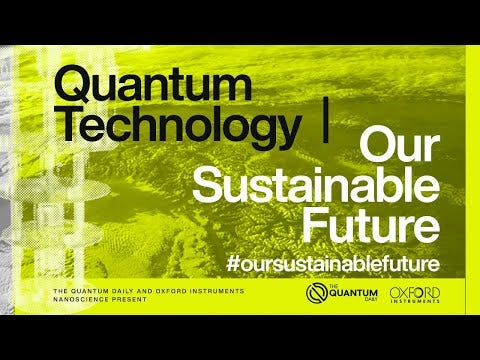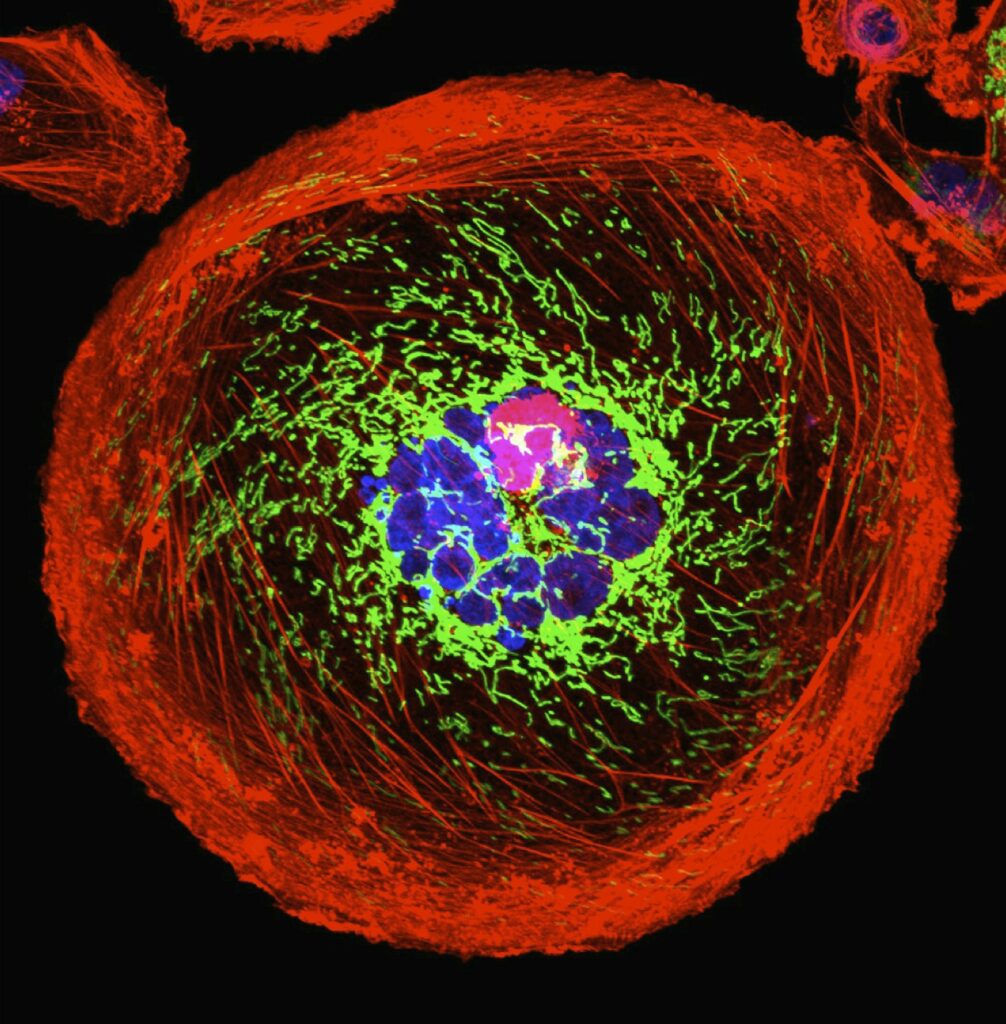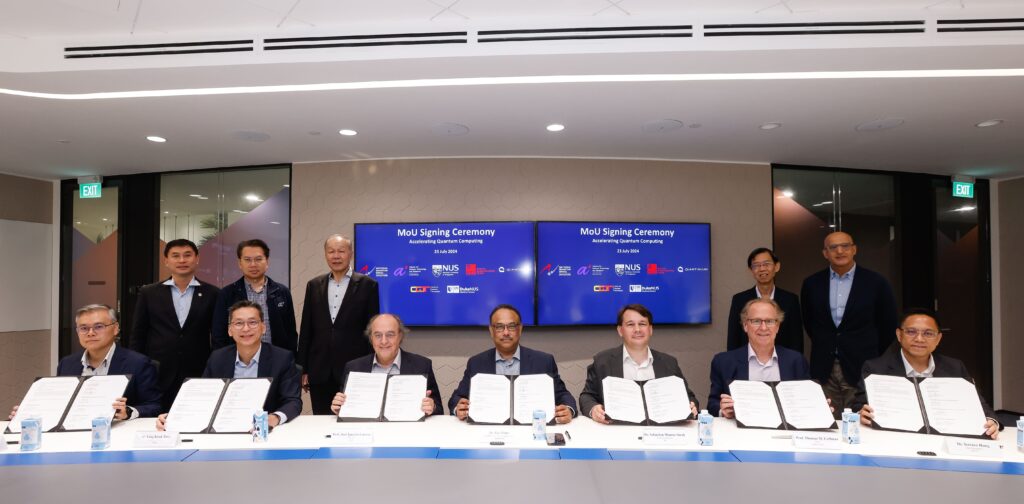Strong Advocate
Saving the planet, that’s what we all want, right? And with global warming having a major effect on weather patterns and temperature rises in the oceans, for example, it’s time to pull our hands out of our pockets and get to work making a change for the better.
The Quantum Insider (TQD) is a strong advocate for attitudes to change here, especially by leveraging the power of quantum technologies to get to net zero carbon emissions by mid-century, in line with the Paris Agreement, signed in that city on 12 December 2015.
Seven long years have passed since then, and though things are heading in the right direction, more needs to be done.
Quantum Technology | Our Sustainable Future
Released in the summer of 2021 (with a reflective piece about what has happened one year on here), the documentary Quantum Technology | Our Sustainable Future, developed in partnership with Oxford Instruments NanoScience, gathered industry experts to discuss the potential of quantum technology in addressing the world’s urgent sustainability challenges and is proof TQD is playing its part too.

But it doesn’t stop there, for TQD regularly publishes content on the topic with examples here, here and here. And the editorial team — always searching for unique stories or opinions from the leading minds in the industry — will never tire of doing it.

One good example of this was the PLAMADISO talk available on YouTube “Can Quantum Computing Really Save the Planet?” by David Rejeski, an Associate Researcher at the Weizenbaum Institute and Visiting Scholar at the Environmental Law Institute in Washington DC. Organized by the Research Group “Digital Economy, Internet Ecosystem & Internet Policy” at the Weizenbaum Institute for the Networked Society, the presentation is an enlightening 35 minutes from an expert in the space.
Here is the abstract:
Here is a recent sampling of a few billboards along today’s information highway: “Quantum computing just might save the planet”, “Quantum computers could change the world — provided they work”, and “Quantum Computing Will Be Bigger Than the Discovery of Fire!” There is plenty of industry and government money chasing the quantum dream (approximately US$5 billion in 2021, with funding for startups doubling during that year) and, as one would expect, significant hype drawing on a familiar litany of superlatives — disruptive, game-changing, transformational, and a ‘big deal.’ All this is likely to leave policymakers and the environmental community confused about the promise of a technology few mortals can even understand.
The purpose of this talk to look beyond the ‘reality distortion field’ surrounding quantum computing, especially in regard to quantum computing’s potential contribution to solving our shared environmental challenges. There are four questions that can be asked of quantum computing, questions that must be revisited and updated as the technology and markets mature:
If practical quantum computers emerge, exactly what could they accomplish for the planet that existing supercomputers, or other competing technologies (even outside of the IT sector), could not accomplish?
Can quantum computing provide these solutions in a timely and equitable fashion, overcoming challenges of scaling to address near-term and time urgent environmental problems?
Could quantum computing exacerbate existing energy and resource use and associated environmental damages?
What policies might be put in place to advance both the technology, its positive environmental impacts, and its global access?
This presentation will summarize research supported by the Internet Society Foundation that looks at what is known (and not known) about the energy use of quantum computing systems and the environmental benefits from potential quantum computing applications, attempting to separate realistic short-term applications from applications that may be decades away.
Six Months of Thinking
The gist of the talk gives insight into Rejeski’s thoughts on quantum computing over the previous six months. With the usual introduction to quantum, along with reporting on some of the hype around the technology, investment and future markets, a brief tour of the startup ecosystem, and some of the use cases.
That out of the way, Rejeski — whose research over the last two decades has focused on the public policy and governance implications of emerging technologies, ranging from nanotechnology to synthetic biology and additive manufacturing, while also pioneering the use of video game technologies to engage the public in complex policy topics, ranging from national budget formulation to climate resilience — got down to the important topic of quantum computing saving the planet.
“Is it going to use a lot of energy?” said Rijeski to open. “Forty percent of the energy will be required just to keep these systems cool,” he then added, referring to superconducting technologies and mentioning Google’s quantum computer as an example.
Rijeski then mentioned Avoided Energy, and that supercomputers at NASA and Google required 21 to 97 MWh to run a problem versus .00042 MWh on a quantum computer, though he did say it was an abstract benchmark.
“There are two things, how much energy will be used by quantum computing — personally I’m not worried about that,” said Rijeski. “The other thing to remember is this artificial battle between quantum computers and supercomputers is a myth.”
Rijeski then pointed out that quantum computers will be integrated into hybrid computing systems, and they would work together with classical computers in parallel, taking on the role, as Rijeski said, “that would be computationally intensive”.
The Weizenbaum Institute researcher followed by laying out some possible interventions where quantum technology could assist with climate change — these are:
- Improve our understanding of quantum computing energy use and make quantum computing, including the development of harmonized metrics to measure overall energy impacts, part of a larger effort to support sustainable computing.
- Bring together quantum technical experts and use case experts to develop a portfolio of environmental problems where quantum computing could provide measurable improvements over other options and design ways to accelerate their deployment and commercial adaption.
Saving The Planet: Yes or No
Nearing the end of his talk, Rijeski went back to the original question: Will quantum computing save the planet?
“No, I don’t think so,” he began, “it’s probably not going to have a huge impact in the near term, but going out ten, fifteen years, there’s no doubt in my mind that this is real, it’s significant and it will play a role. By thinking of this now, I think we may be able to shape it and move quantum computing in the sustainability space faster.”
That’s positive news.
The last two hundred years have been rough on our planet. Seeing that it was doing all right for an estimated 4.5 billion years before that, humans have a lot to answer for.
Maybe quantum can reverse the damage.
If you found this article to be informative, you can explore more current quantum news here, exclusives, interviews, and podcasts.
Feature image: Image by Gerd Altmann from Pixabay



















